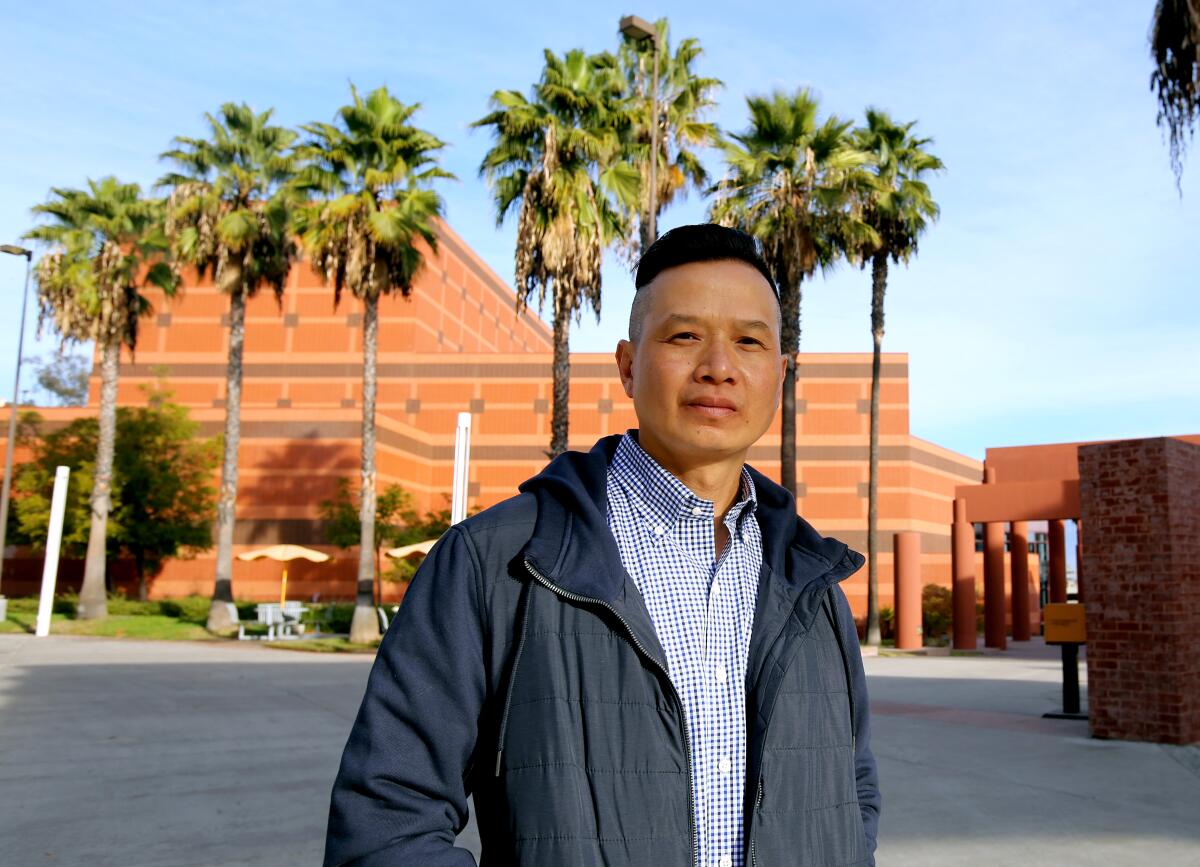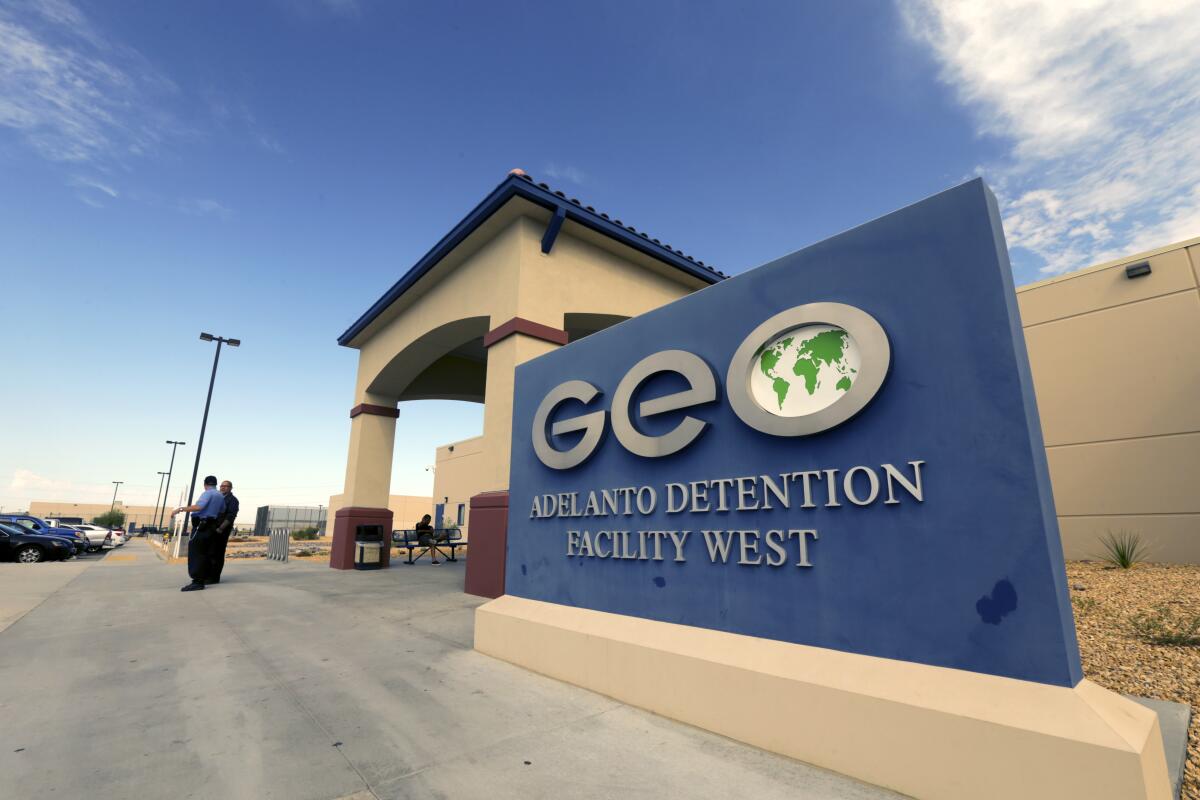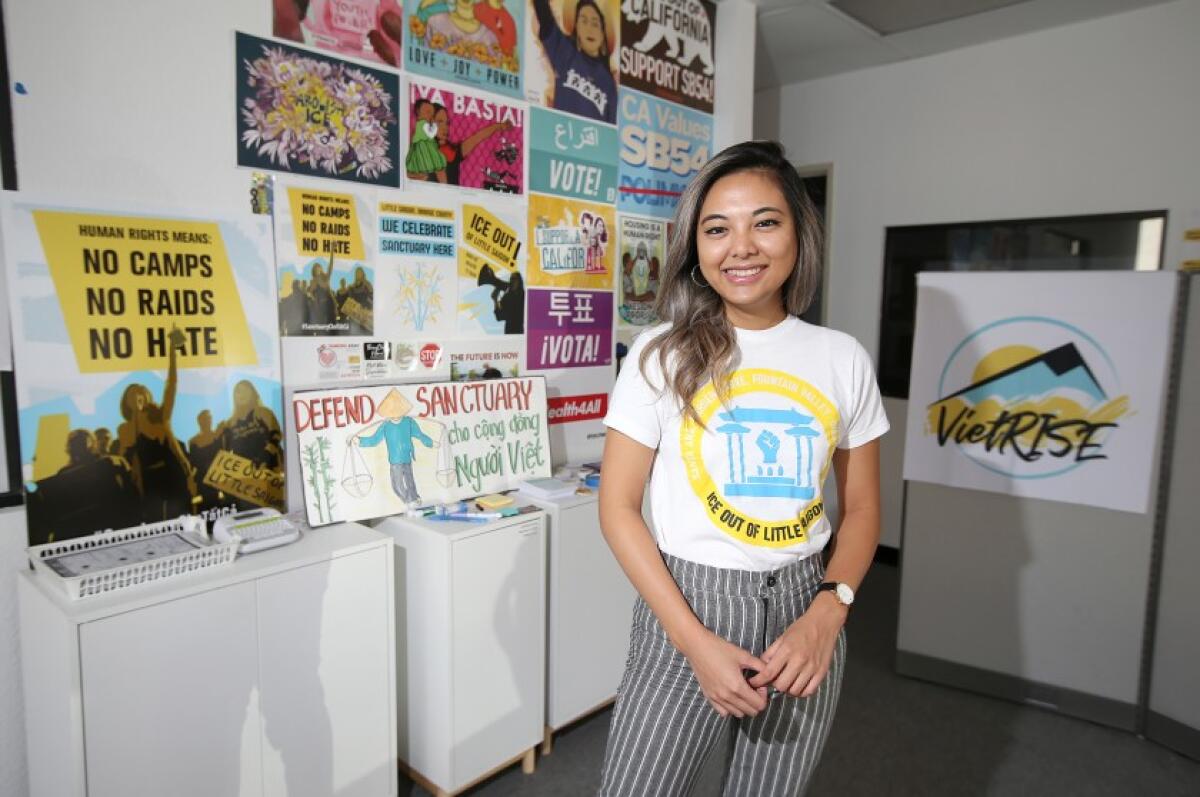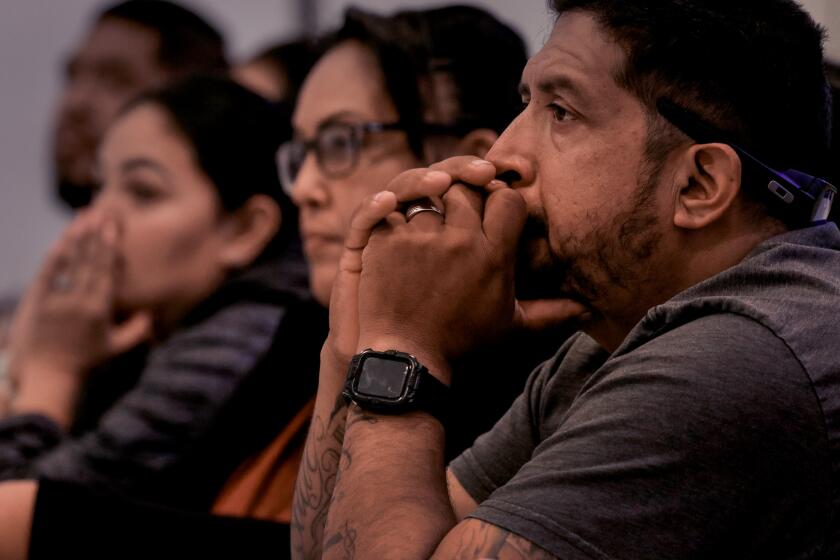Tin Nguyen’s prison sentence was commuted, but he landed in ICE detention. Here’s his path to freedom

Tin Nguyen slept in on Christmas Eve 2018. It was a light sleep. Nguyen says at California State Prison in Lancaster you sleep light for your own safety.
He heard his cell number, 144, prison number, 06, and last name called over the mic. His door popped open and he ran to the prison’s tower.
“Are you sure?” he asked. A guard confirmed.
Nguyen’s sentence, life without possibility of parole, had been commuted by Gov. Jerry Brown.
“I was so happy — on cloud nine that day,” Nguyen said. “It was chaotic. I just ran around giving hugs to everybody.”
The now 48-year-old was convicted of first-degree murder in 1999 and had two additional convictions in California. He served more than 20 years in prison and says he feels remorse for his crimes.
Although he had applied and interviewed for commutation, the decision was unexpected. He thought he would die in Lancaster. There were other prisoners who also ran to the tower because they misheard their name over the mic. Nguyen said the image of the prisoners’ shoulders slumped as they walked back to their cells stays with him.
A year later, Nguyen was escorted out of prison as a parolee. Most parolees met their families outside the prison gates, but Nguyen was shackled and escorted into a U.S. Immigration and Customs Enforcement van.
He arrived in the U.S. from Vietnam at age 6 in 1979. Nguyen didn’t speak English at the time and struggled to find a sense of belonging. He grew up in Pomona and at one point joined a Vietnamese gang.
His first run-ins with ICE happened around his arrests in the ‘90s. But in 2008, while Nguyen was serving his prison sentence, the U.S. and Vietnam signed an agreement that excludes Vietnamese nationals who arrived in the U.S. before July 12, 1995, from being subject to deportation. Many of those who arrived before that date were refugees of the Vietnam War.
“I wouldn’t know what to do [if I were deported],” Nguyen said. “I’d do my best to survive, but the stress of unemployment, not having the command of the language and the culture shock — it’s gonna be a high stress factor on my life and on my rehabilitation.”
In an ongoing lawsuit filed in 2018, the nonprofit Asian Americans Advancing Justice asserts that ICE was unlawfully detaining Vietnamese immigrants. Typically, ICE had released pre-1995 Vietnamese immigrants with final orders of removal within 90 days of detention but began re-arresting those individuals in March 2017, detaining them for lengthy periods.
Nguyen thought he’d spend about three months in the Adelanto ICE Processing Center, a facility in San Bernardino County. Instead, he spent nine months in detention.

Adelanto
The detention facility in Adelanto is one of four private-run institutions in Southern California. The GEO Group-owned detention center holds people who have overstayed visas, arrived in the country illegally or are permanent residents who committed crimes while immigration judges decide whether they should be deported.
The GEO Group company has been sued repeatedly over allegations of violence, and it has been the subject of federal reports over failures to keep detainees safe.
Last year, Gov. Gavin Newsom signed a bill banning private prisons and immigration detention centers, like Adelanto, from operating in California. The bill prevents the state from entering into or renewing contracts with for-profit prison companies after Jan. 1, 2020, and phases out such facilities by 2028.
Nguyen said Adelanto, like prison, had its factions. When he arrived, detainees asked him who he ran with — the paisanos (non-English speakers) or the homies (English-speakers who were gang members).
“Since I don’t participate in gangs no more I just told them, I run on my own. I’m Asian. I just want to walk that way,” Nguyen said. “At first they kind of pushed me a little bit. But they left me alone eventually.”
He made a few friends in both groups, communicating with Spanish-only speakers using gestures and an English-to-Spanish translation book. He was also housed in the same dorm with an immigrant from Vietnam who didn’t speak English.
Nguyen said he could describe his experience in the Adelanto facility only as demeaning — from the way he was addressed by guards, to the bureaucratic runaround of his immigration case, to watching those with a language barrier unable to represent themselves.
“Even when I was a criminal, a [police] officer or the correctional officer, they still in some way treated me as a human,” Nguyen said. “They had a little compassion. No matter what, I knew I had a right to speak up to them and voice my opinion. ICE culture is different.”
Prison made sense to Nguyen. He committed a crime and was serving time. He also had a productive routine. Nguyen would wake up, pick up his dog from the Paws for Life program and take care of her before heading to work. After work, he’d go to school through Cal State L.A.’s Lancaster Prison Program. Then he’d pick up his dog again, take her for a walk and end the day by watching a movie.
In Adelanto, they’d open up the cell doors at 6 in the morning and close them near 1 a.m. There were showers, phones, books and two TVs.
“I came from an active life to just sitting around watching TV all day,” Nguyen said.
One TV was for Spanish speakers, the other for English speakers. He found out about COVID-19 by watching broadcast news.
Nguyen said he saw guards put up social-distancing signs, take a photo, then take the signs down. When hand-sanitizing dispensers were installed, he found they were empty. Six feet of social distancing was impossible in Adelanto. Surfaces such as tables and showers were sprayed but not wiped down, he said.
Alexx Pons, a spokesman for ICE, stated in an email that “ICE has taken proactive measures to tailor conditions across its detention network to maintain safe and secure environments for detainees and staff since the onset of the pandemic, while adhering to guidelines for the prevention and control of infectious and communicable diseases from the CDC. This includes reducing the overall detained population, providing appropriate hygiene products and personal protective equipment (PPE) to all staff and detainees, suspending social visitation, and maximizing social-distancing practices with staggered meals and recreation times.”
Pons referred to ICE’s website for details on its pandemic response requirements.
ICE has come under scrutiny for its response to the virus, including officials refusing to allow all of Adelanto detainees to be tested.
During Nguyen’s last month in detention, he was under lockdown because there was a coronavirus outbreak in the Adelanto facility. A day after his release, a judge ordered the Adelanto facility to reduce population to allow social distancing after a months-long battle over the safety of detainees.
As of Dec. 20, the Adelanto facility listed 264 confirmed COVID-19 cases and zero deaths. According to ICE’s online database updated on Dec. 14, 351 detainees with criminal charges or convictions were released in California under judicial order.
The case for release
In Los Angeles and Orange counties, attorneys, Nguyen’s family and community organizers rallied for his release.
Nguyen had been in touch with attorneys from O’Melveny & Myers LLP since his time in Lancaster prison. Taffany Lim, senior director of Cal State L.A.’s Center for Engagement, Service and the Public Good, connected Nguyen to attorneys when she reached out to her college roommate, Laurel Loomis Rimon.
“Tin had really stood out and had the support of everyone — from the governor through the commutation of his sentence, to professors at Cal State L.A., to the people he worked with in the program for dog training. He had a very compelling story,” said Rimon, O’Melveny & Myers attorney and partner.
His three attorneys, including Alex Duran and Ben Seelig, tried multiple legal methods for release, including a habeas corpus petition.
They also wanted to make his case more public and reached out to O.C.-based VietRISE as well as Asian Americans Advancing Justice and CARECEN.
“After several months on this into the summer of 2020, we were going to file a habeas petition … we thought that there should also be an element of the Vietnamese community and the Vietnamese diaspora supporting him as well,” said Seelig.
“VietRISE is a young organization that understands social media and connects some of those cultural issues that we don’t focus on since we’re only really honed into the legal side of it,” he said. “They took on Tin’s campaign, and we really think they cracked it open.”

VietRISE was created in 2018 to advocate for social justice with Vietnamese and immigrant communities at the center through youth organizing, arts and cultural engagement and, more significantly for Nguyen, campaigns for immigration justice.
For the organization’s Bring Tin Home campaign, the first of its kind for VietRISE, they created a public petition and received support from local officials and congressional leaders. They also held a press conference in front of the ICE Santa Ana office where Nguyen’s mother and sister were able to voice their frustrations.
“We know that Tin has done a lot of work,” said Tracy La, VietRISE executive director. “In his 20 years of incarceration he did a lot of interviews and he was known by a lot of people across the state and across the country for the work that he did. The stories that he tells resonated with a lot of Southeast Asian refugees who faced racism and abuse as kids and joined gangs as a result. I think all of that played a huge role in why his story was hit so hard.”
VietRISE received several messages through email, Facebook and Instagram from people who knew Nguyen while he was incarcerated in Lancaster as well as first-generation O.C. residents and beyond.
“Many of the communities we work with have had some kind of contact with ICE, either through being detained or having family members who are detained,” La said. “We have a relief fund, where we’ve been able to provide some type of financial assistance to those who are undocumented. These are the folks that make up the majority of the people we work with.”
The campaign started in early September and ended about two weeks in when VietRISE was notified Nguyen was going to be released.
Seelig said they thought they would have to litigate for weeks, if not months. But Nguyen’s lawyers were in the middle of a meeting with the government attorney discussing the habeas corpus petition on Sept. 25 when they received an email saying Nguyen was going to be released the following Monday.
“Throughout the case, we found it hard to get a full assessment of what the process behind the scenes was for getting contractual documents for how decisions pertaining to [Nguyen’s] custody were made,” Seelig said. “Even through our interactions with the government attorney, it seemed like he was somewhat in the dark as well. I think it’s the broader policy towards these pre-1995 individuals as to whether they’re detainable … or whether it’s a case by case basis. It’s still a mystery to us.”
Duran added that “pre-1995 Vietnamese immigrants are not removed very often and there’s ongoing litigation,” referring to the class action lawsuit filed by Asian Americans Advancing Justice.
Carissa Cutrell, ICE spokesperson, stated that “as of Dec. 12, there were 86 Vietnamese nationals in U.S. Immigration and Customs Enforcement custody.”
Post-release
On the day of his release, Nguyen said he fell to his knees, cried and apologized to his family as soon as he got off Adelanto detention property. He had a panic attack during the drive to his transitional housing in East L.A. His new cell phone was buzzing with texts and calls congratulating him and his ankle monitor started vibrating because it had a low battery.
“Everything was moving too fast,” Nguyen said.
For now, he plans to live in transitional housing for an entire year even though only six months are required.
Nguyen likes to wake up early in the morning to go jogging. Whenever he can, he goes to Cal State L.A. to volunteer. He helps staff reply to letters from prisoners seeking to enroll in college courses, the same program he participated in through Lancaster prison.
He needs two more classes to complete his bachelor’s degree in communications. He likes the sound of “Professor Nguyen” and is entertaining the idea of getting a master’s and a doctorate.
“I can’t wait for the campus to open, though. Just walking on the campus and experiencing the atmosphere of it,” Nguyen said.
He has his frustrations, like not having money, and is waiting for a work permit to start applying for jobs. But he tries to remind himself that “free people problems are way better than prison people problems.”
Nguyen is learning how to use a smartphone. The lawyers get plenty of texts and photos from him.
“He sent us a picture of his first free sunset. … He’s constantly sending us messages. We think of him as a friend now,” Duran said.
And he’s also catching up on pop culture — watching “The Mandalorian” and “Game of Thrones.”
His deportation status is pending.
Pons said Nguyen received a final order of removal from an immigration judge on Jan. 14 and “remains on order of supervision while he awaits the resolution of his removal proceedings.” Whether immigration officials will be able to get travel documents from Vietnam is yet to be seen according to Nguyen’s lawyers.
Nguyen is looking forward to spending Christmas with his family, even though he might just be standing outside in the yard of his mother’s Chino Hills home, waving from a safe social distance.
Castaneda writes for the Daily Pilot.
Support their coverage by becoming a digital subscriber.
More to Read
Sign up for Essential California
The most important California stories and recommendations in your inbox every morning.
You may occasionally receive promotional content from the Los Angeles Times.











